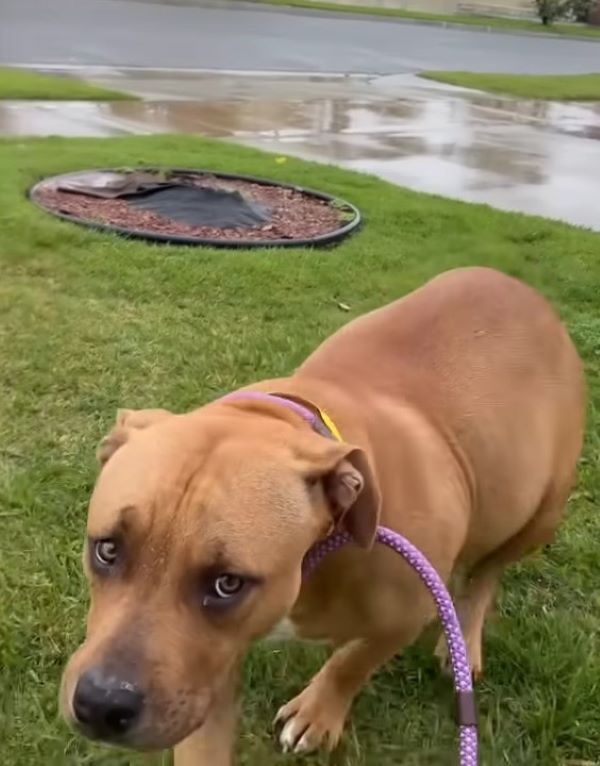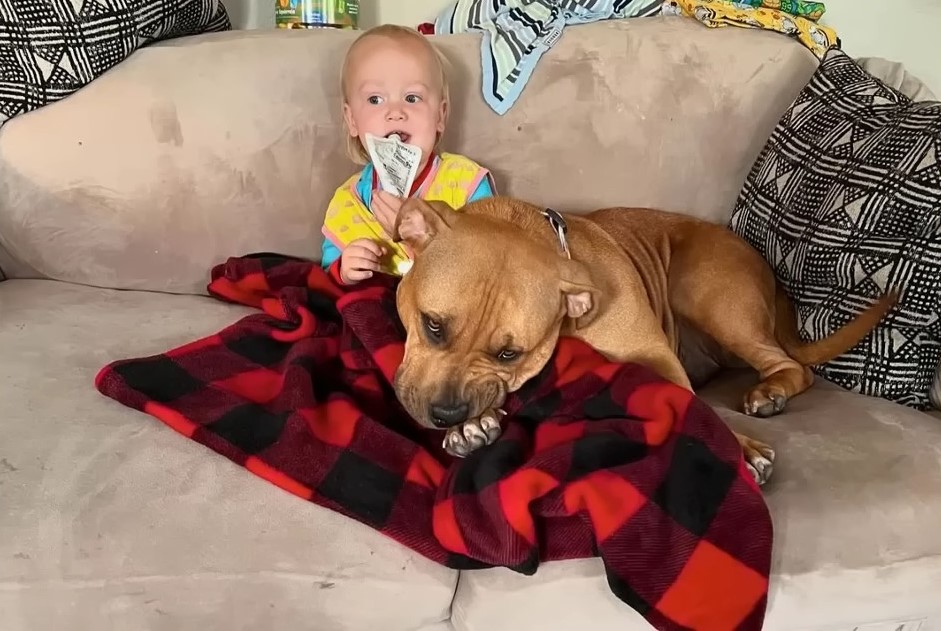Witnessing a pup getting cruelly abandoned by his owner is probably one of the most depressing things ever.
What’s even worse is when people abandon pregnant dogs when they know how difficult it is going to be for them to survive on their own.
Just as things were starting to get really difficult for her, a group of rescuers found her and realized she desperately needed help.
Meet Stormi

Just as they had found her, they were shocked to find that she was surviving on her own in very harsh weather.
It was raining, and she was almost ready to give birth. They immediately transported her in a car, and she was taken to a veterinarian clinic.
The dog, now named Stormi, was given a safe haven with a private kennel. In there, she could be on her own and just enjoy being in a warm place for once.
Even though she loved being in a safe space, she was a bit nervous because she was not used to being in an enclosed space.
 Source: Youtube
Source: YoutubeA few days later, she was transferred to a foster home where she would be taken care of when the puppies arrived.
Soon enough, though, the situation had changed in an instant and Stormi had given birth to eight healthy babies. There were five boys and three girls.
Right after that, her motherly instincts kicked in and she started taking care of the puppies. She was such a good mom.
The Most Beautiful Family

With each passing day, they were doing better and growing up. Even with their mother taking care of them, the foster mom constantly supervised them to make sure they were okay.
She also made sure to give mama Stormi some time on her own away from the babies so she could enjoy herself and play around.
After two weeks, the puppies grew to the point where they were hardly recognizable. They were so adorable.
Their foster parents make sure that they are getting everything they need so they can be strong and healthy.
 Source: Youtube
Source: Youtube
With just a little more time, they will be old enough to be placed on an adoption list so their fosters can find them all a forever home.
They are determined to find each and every one of them the perfect family, so they never have to be in the same situation as their mom was weeks ago.
While we don’t know what happened next or if any of them have been adopted, it’s safe to assume that their foster parents are going to make sure that happens.
If you’ve ever wondered about your furry friend’s snooze habits, you’re in for a treat. Understanding how long dogs sleep can shed light on their overall well-being and behavior. As a seasoned dog trainer, observing your pup’s sleep patterns can offer valuable insights into their health and happiness. So, grab a cup of coffee, sit back, and let’s uncover the fascinating world of canine slumber together.
Understanding Dog Sleep Patterns
Dogs have unique sleep patterns that play a crucial role in their overall health and behavior. By understanding these patterns, you can ensure that your furry companion gets the rest they need. Here’s a breakdown to help you grasp your dog’s sleep habits:
1. Amount of Sleep
- Adult dogs typically need 12 to 14 hours of sleep a day.
- Puppies, on the other hand, require up to 18 to 20 hours of sleep to support their growth and development.
2. Sleep Cycles
- Dogs experience sleep cycles similar to humans, including the REM (rapid eye movement) stage.
- During REM sleep, dogs may twitch and move as they dream.
3. Environmental Factors
- Dogs are sensitive to their environment when it comes to sleep.
- Providing a comfortable and quiet sleeping area can help your dog achieve a restful sleep.
4. Age and Breed Differences
- Age and breed influence how much sleep a dog needs.
- Large breeds and older dogs often require more rest compared to smaller breeds and younger pups.
- Changes in your dog’s sleep patterns can indicate underlying health issues.
- Behavioral signs like restlessness during sleep may warrant a visit to the vet for assessment.
Understanding your dog’s sleep patterns is key to promoting their well-being. By being attuned to their needs, you can ensure they have a comfortable and restful night’s sleep, contributing to their overall happiness and health.
Ideal Amount of Sleep for Different Dog Breeds
Each dog breed has its specific needs when it comes to sleep. Understanding how much sleep different breeds require can help you ensure your furry friend gets the rest they need.
- Large Breeds
- Larger breeds like Great Danes or Mastiffs tend to sleep more, often up to 14 hours a day. Their bigger bodies and slower metabolisms mean they need more rest.
- Small Breeds
- Small breeds such as Chihuahuas or Dachshunds may sleep around 16-18 hours a day. Their tiny size and high energy levels can result in more nap time.
- Working Breeds
- Working breeds like Border Collies or German Shepherds need around 12-14 hours of sleep. Their active lifestyles and intelligence require ample rest periods.
- Toy Breeds
- Toy breeds like Toy Poodles or Maltese might sleep up to 18 hours daily. Their small size and tendency to be lap dogs contribute to their extended nap times.
Understanding the ideal amount of sleep based on your dog’s breed can help you create a comfortable environment for them to rest, ensuring they stay healthy and happy.
Common Sleeping Habits in Dogs
Understanding your dog’s sleeping habits is key to their well-being. Different breeds have varying sleep needs. Large breeds like Great Danes can sleep up to 14 hours a day, while small breeds like Chihuahuas may snooze for 16-18 hours. Working breeds such as Border Collies require around 12-14 hours of sleep, and toy breeds like Toy Poodles may rest up to 18 hours daily.
Creating a comfortable sleep environment tailored to your dog’s breed is essential for their health and happiness. Any changes in your dog’s sleep behavior should be noted as they might indicate underlying health issues. Regular veterinary check-ups can help address these concerns and ensure your furry friend’s well-being.
Tips for Improving Your Dog’s Sleep Quality
1. Establish a Consistent Sleep Routine
Keeping a regular schedule for your dog’s sleep can help regulate their internal clock and establish healthy sleep patterns. Try to create a bedtime routine that includes winding down activities like a short walk or quiet playtime before bed.
2. Create a Comfortable Sleeping Environment
Ensuring your dog’s sleep area is comfortable and cozy can significantly impact their sleep quality. Provide a soft and supportive bed that suits your dog’s size and sleeping habits. Additionally, consider factors like room temperature, lighting, and noise levels to optimize their sleep environment.
3. Encourage Physical Activity During the Day
Regular exercise and playtime during the day can help your dog expend energy, leading to a more restful sleep at night. Engaging in physical activities can also promote mental stimulation, reducing the likelihood of restlessness or anxiety at bedtime.
4. Monitor Diet and Feeding Times
Be mindful of your dog’s diet and feeding times as these can affect their sleep quality. Avoid feeding your dog large meals right before bedtime to prevent discomfort or digestive issues that could disrupt their sleep. Consult your veterinarian for guidance on an appropriate feeding schedule.
5. Provide Mental Stimulation
Engage your dog in mental exercises such as puzzle toys or training sessions to keep their minds active and prevent boredom. Mental stimulation during the day can help prevent nighttime restlessness and promote better sleep quality.
6. Address Any Underlying Health Issues
If you notice significant changes in your dog’s sleep patterns or behavior, consult your veterinarian to rule out any underlying health issues that may be affecting their sleep. Addressing health issues promptly can help ensure your dog gets the rest they need for overall well-being.
Conclusion
Understanding your dog’s sleep needs is crucial for their well-being. Different breeds have varying sleep requirements, with large breeds like Great Danes needing up to 14 hours and small breeds like Chihuahuas sleeping around 16-18 hours. Tailoring the sleep environment to your dog’s specific needs is essential. Monitoring changes in their sleep behavior can indicate underlying health issues. By establishing a consistent sleep routine, creating a comfortable sleeping environment, encouraging daytime physical activity, monitoring diet and feeding times, providing mental stimulation, and addressing health issues promptly through veterinary consultation, you can prioritize your dog’s sleep habits and overall health, ensuring their happiness and well-being.
Frequently Asked Questions
How many hours of sleep do Great Danes need?
Great Danes typically need up to 14 hours of sleep per day to stay healthy and energized.
How many hours of sleep do Chihuahuas need?
Chihuahuas usually require around 16-18 hours of sleep daily to maintain their well-being.
Why is it important to monitor changes in a dog’s sleep behavior?
Changes in a dog’s sleep behavior can indicate underlying health issues that need prompt attention for their well-being.
What are some tips for optimizing a dog’s sleep routine?
Establish a consistent sleep routine, create a comfortable sleeping environment, encourage daytime physical activity, monitor diet and feeding times, provide mental stimulation, and address any health concerns promptly.
[no_toc]

Hey there, I’m Janet Brooks, a dog-loving student from California. I’m all about helping pups in need, especially those without homes. Me and my awesome friends work together to give shelter and love to stray dogs. Oh, and I also write blogs about dogs to share helpful info.